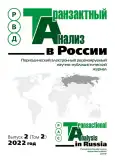Том 2, № 2 (2022)
- Год: 2022
- Выпуск опубликован: 29.12.2022
- Статей: 19
- URL: https://ta-journal.ru/TAR/issue/view/6092
Весь выпуск
От редакции
 6-7
6-7


Языком науки
Обзор возможностей по работе с тревогой в рамках транзактно-аналитического подхода на примере анализа психотерапевтического случая
Аннотация
В данной статье исследован практический кейс психотерапии клиента с тревогой. Представлен обзор различных инструментов и методов, проведен анализ работы, выделены преимущества и недостатки различных методов работы. Сделан вывод о том, что возможна работа с тревожными клиентами в транзактно-аналитическом подходе. Психотерапия должна включать в себя структурный и функциональный анализы, распутывание чувств Ребенка, доращивание опор Взрослого, развитие внутренней опеки, обучение новым безопасным способам поведения в ситуациях, вызывающих тревогу.
 8-12
8-12


Изменения в личности женщины после рождения ребенка
Аннотация
В данной статье рассмотрены изменения в личности женщины, которые происходят с ней после рождения ребенка. Объектом исследования выступает идентичность – как часть личности, в которой происходят изменения, и в частности – идентичность матери как область идентичности, строящаяся вокруг способности женщины быть матерью. Предметом исследования является взаимосвязь статуса идентичности матери и ее удовлетворенности материнством. Мы рассмотрим основные механизмы формирования идентичности с точки зрения Транзактного анализа, а также научные исследования этой темы, проведенные на данный момент, и построим теоретическую модель идентичности матери. Данная статья написана по материалам магистерской работы.
 13-23
13-23


Обсессивно-компульсивная динамика расстройств пищевого поведения. Транзактно-аналитический взгляд (данная публикация является частью магистерской диссертации с выходными данными)
Аннотация
В статье представлены результаты теоретического соотнесения транзактно-аналитических моделей эмоциональной грамотности К. Штайнера, обсессивно-компульсивной динамики личности А. Головань и механизмов формирования расстройств пищевого поведения. Также описаны результаты эмпирического исследования взаимосвязей между выраженностью обсессивно-компульсивной динамики личности и наличием РПП. Обсессивно-компульсивная динамика операционализирована через показатели уровня выраженности тревоги, алекситимии и эмоциональной грамотности. Представлены результаты корреляционного анализа взаимосвязей между показателями алекситимии по Торонтской шкале TAS-20, выражающей дефицит когнитивной переработки и регуляции эмоций, и показателями уровня эмоциональной грамотности по Шкале эмоциональной осведомленности К. Штайнера.
 24-31
24-31


 32-33
32-33


 34-35
34-35


 36-39
36-39


"Я - О`кей, Ты - О`кей"
 45-53
45-53


 40-41
40-41


 42-44
42-44


Ирина Пингарева: «С помощью телесных техник мы можем пройти по короткому пути в проживание травмы»
Аннотация
Интервью с Ириной Пингаревой, психоаналитиком, Сертифицированным Транзактным аналитиком европейского реестра CTA-P-EATA, телесно-ориентированным терапевтом, преподавателем МИР-ТА, автором тренингов и семинаров – об особенностях работы с телом в рамках Транзактного анализа.
 54-56
54-56


История ТА
 57-58
57-58


Навигатор по миру ТА
 59-61
59-61


Тезисы научно-практической конференции СОТА «Устойчивость и целостность идентичности, как ресурс сохранения отношений в изменяющемся мире»
Аннотация
Начало 2020-х ознаменовалось изменениями в разных сферах жизни людей на глобальном и локальном уровнях. Российская перемена февраля 2022 года поставила под сомнение отношения, которые удалось сохранить в локдаун. Речь как о социальных, личных, так и терапевтических контактах. В сложившейся ситуации кризиса психологи в своей профессиональной деятельности столкнулись с новыми вызовами. В такие исторические моменты вырастает значимость профессионального сообщества, особенно в институционализированной их форме. В 2022 году такой структурой в среде ТА-психологов стала Санкт-Петербургская Организация Транзактного Анализа (СОТА), в рамках деятельности которой была организована серия мероприятий.
 62-68
62-68


Как я выбирал Транзактный анализ и нашел своего тренера?
Аннотация
В этой статье выпускники 202-го курса рассказывают о своем опыте прохождения обучения. Почему было отдано предпочтение Транзактному анализу? Как проходило обучение? Что они могут порекомендовать тем, кто только начинает свой путь?
 69-77
69-77


 78-83
78-83


 84-84
84-84


Отзывы на книги
Рельсы развития Транзактного анализа в организационном и индивидуальном направлении
Аннотация
Моя рецензия на книгу Гюнтер Мор «Индивидуальный и организационный ТА в 21 веке» составлена таким образом, что описывает самые главные, на мой взгляд, вопросы, которые затронул автор. Я старалась писать ее так, словно только начинаю знакомиться с ТА. Так как все мы в современном обществе живем на высоких скоростях, рецензию я стремилась сделать небольшой, но емкой. Надеюсь, мой субъективный взгляд будет полезен тем, кто хочет узнать, что такое анализ в психологии.
 85-86
85-86


Что такое «Сад ТА» и модель «Звезда»?
Аннотация
Рецензия на книгу Гюнтера Мора «Индивидуальный и организационный ТА в XXI веке» Анастасии Фазетиновой – психолога, блогера, предпринимателя, в которой она описывает свои впечатления от прочтения и дает краткую информацию о том, чем эта книга может быть полезна и интересна.
 87-87
87-87











